Sage is a great herb to grow in your garden. While this herb is well known for smoke cleansing, sage has many more uses than just for smudging and cleansing. If you are looking for new and different ways to use sage, check out this great list of creative ways to use sage in your home.
How to Use Sage
While many people grow sage in their garden, they want to know exactly what to use sage for after it is grown. Here are some great ways to use sage in cooking, around the house, in cleanings and purifying airborne bacteria, as well as in tea and for cleaning.
Fresh sage is a wonderful plant that is easy to grow. Click here for how to grow sage. Now that you have grown sage in your garden, put it to use!
How to Use Sage in Cooking
Using sage in your kitchen is a good way to change the flavor of some of your favorite dishes. Sage is astringent but warm, a bit bitter, and very strong. A little sage can go a long way when cooking so start by going lightly and add more to taste even when working with recipes from your favorite trusted creators. Another great way to manipulate the flavor of sage is to adjust when you place the sage into your recipe, for a stronger sage flavor add your sage early on in cooking, for a lighter flavor add sage close to the end of cooking.
Sage is a vital ingredient to your favorite sausages and a staple if you enjoy making your own sausage at home.
Most cooks will use dried common sage to add flavor to pork, chicken, beef, and lamb. Sage is a great addition to your favorite stews and soups, particularly hearty winter ones. Keeping dried sage leaves on hand and simply crumbling them into your soup and stew recipes is a great way to make the most of this woodsy flavor.
One of my favorite ways to use sage when I am cooking is with sage-infused extra virgin olive oil. Sage-infused olive oil is amazing for adding flavor to chicken on the grill, sauteing fresh vegetables, and searing meats. When infusing olive oil with sage simply add a few dried leaves to your oil and let sit in a cool dark place for several weeks or months. You can opt to then remove the sage from the oil or let it remain mixed with the olive oil to get a stronger flavor.
Sage is a great way to add flavor to vegetables when cooking. Sage oil will add depth to your favorite vegetable and bean dishes giving you a fresh unique flavor perfect for pairing with savory meats.
Sage makes a great addition to herbed butter for quick and easy sauteing, dipping bread, and adding a dash of flavor to vegetables and mashed potatoes. To make herbed butter simply soften your butter and use a hand mixer to mix in fresh or dried herbs including sage, basil, oregano, thyme, rosemary, bay, or any combination of those wonderfully flavorful herbs.
If you want to surprise your guests or try something unique, add sage to a fruity simple syrup. Lemon and pineapple both make great partners for sage. Add a simple syrup of fruit and sage to cocktails or as an ice cream topping for a unique summer flavor with an enticing aroma.
Freeze sage in ice cubes to toss into summer drinks for a hint of flavor. Sage being part of the mint family is a great pairing with tea and lemonade for a refreshing summertime beverage.
Sage can be used fresh right in your favorite salad recipes for a kick of flavor. Tinder young sage leaves are best for adding to salads and can make a great addition to a summer meal.
Sage makes a great addition to your favorite stuffing recipe perfect for pairing with a perfectly roasted butter and sage turnkey. Sage stuffing also p[iars well with other poultry like chicken and duck for use throughout the year.
Sore throats in the house? Make sage tea for a throat soothing option when you or your family are sick. Sage tea like mint tea is a great option for setting your stomach and aiding indigestion. Sage tea can be gargled to help with a sore throat or toothache.
Benefits of Sage in the Home
While most people know that you can use sage to make a sage stick for smoke cleansing many are surprised to discover that it is not the only use for sage in and around the home. Below are some great ideas for using your fresh garden sage from spiritual cleansing to energy clearing to putting together sage kits for a housewarming gift to clear negative energy away from a new home.
The burning of herbs is an ancient practice that goes back eons to indigenous tribes in North America and other parts of the world. They were sacred herbs that were thought to have medicinal properties and used in Native American culture for medical purposes as well as for clean energy (clearing energy). Sage smudging for spiritual hygiene is a practice that dates back thousands of years.
Burning Sage Benefits: repelling insects, improve your mood (a calming benefit), air purifier.
How to smudge sage: start at the front door of the home and light your smudge stick. Move carefully about your home in a clockwise manner. Allow the sage smoke to drift into hidden spaces, small spaces like inside closets, basements, and dark corners, as well as into the main areas of the house and other living spaces.
How to put out sage after smudging: Put out the sage smudge stick (sage wand) as you would a cigar or cigarette in an ashtray, or in the sand.
As always, be mindful of burning objects, including ash. You may want to consider your smoke alarms (will they go off if there is smoke?) and open the window when you have finished (or if it gets too smokey).
Put together a sage kit with a smudge wand and some matches as a housewarming present. Include a card to come over and perform the smudging ritual at the new home to rid it of unwanted energy and toxic energy and remove the bad energy and bad vibes from the new home. You can also purchase a smudge stick at amazon.
Sage makes a great addition to your garden. Growing sage will help attract bees, butterflies, and hummingbirds to your garden. This will help attract vital pollinators to your garden.
Sage is great for adding a light calming fragrance to your home. Simmering sage and lemon slices in water on the stovetop is a great way to enjoy this fresh herb to help make your home smell great. This stovetop potpourri smells much better than burning sage to many (most) people making for a more relaxed atmosphere.
Sage’s similarity to mint and eucalyptus does not end with tea. It is also a great way to clear your sinuses. Add sage to herbal steam to clear your sinuses and make it easier to breathe.
Sage has antimicrobial properties making it a great option for natural cleaning. Insuring your cleaning vinegar with sage is a great way to make a natural germ-killing cleaner perfect for cleaning your kitchen and bathroom without chemicals.
Note: None of this is meant as medical advice. I am not a doctor and do not play one on the internet. Please consult a physician if you have any questions about using essential oils so your doctor can better explain to you the benefits, possible side effects, and any warnings about essential oils.
More uses for garden plants:
● 12 Amazing Uses for Lemongrass
● 10 Fabulous Uses for Dandelions
● Sunflowers: 7 Creative Uses for Sunflowers
● If you enjoyed this post, be sure to sign up for the Ann’s Entitled Life weekly newsletter, and never miss another article!
● For more Garden posts on Ann’s Entitled Life, click here.
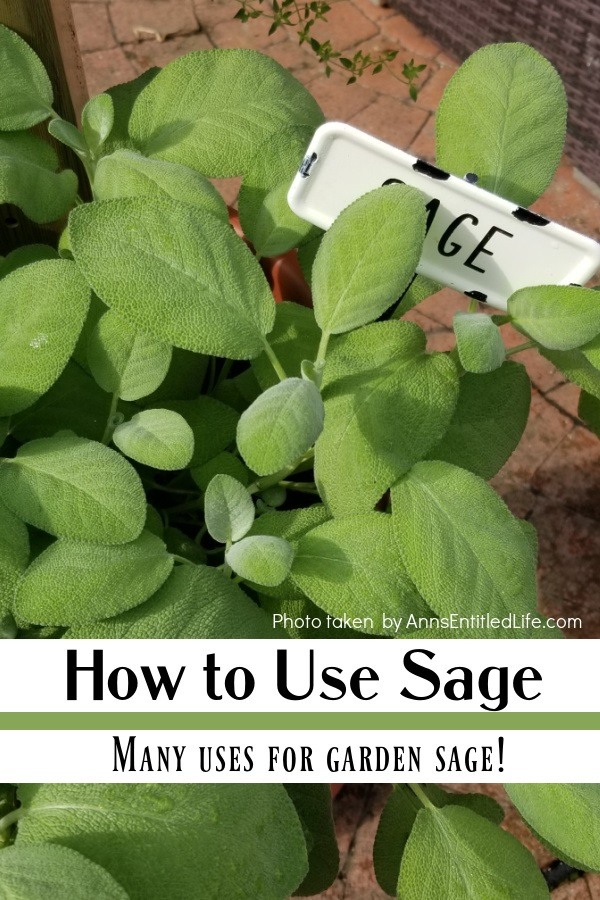
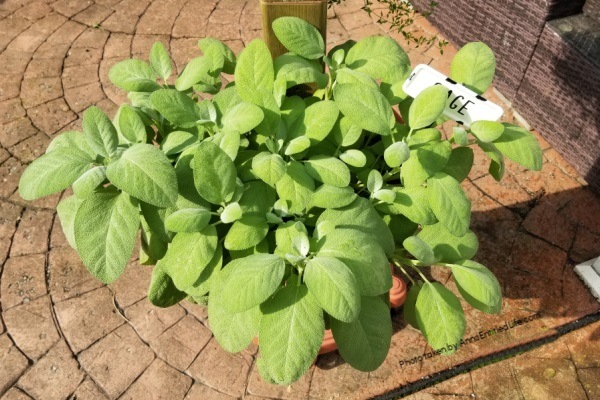
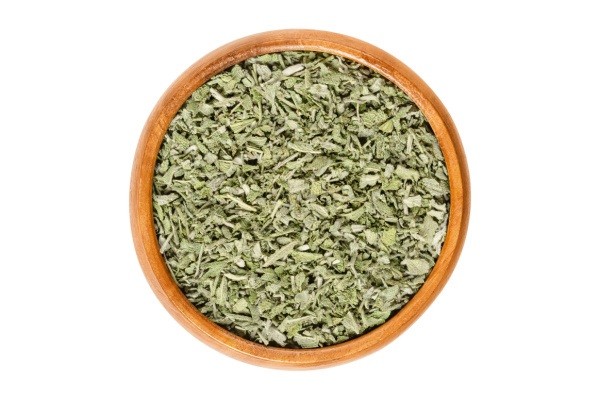
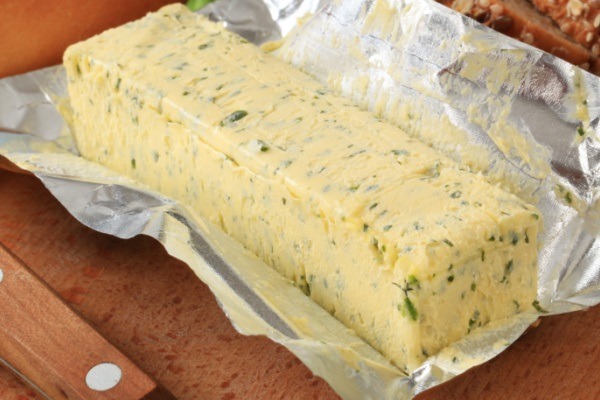
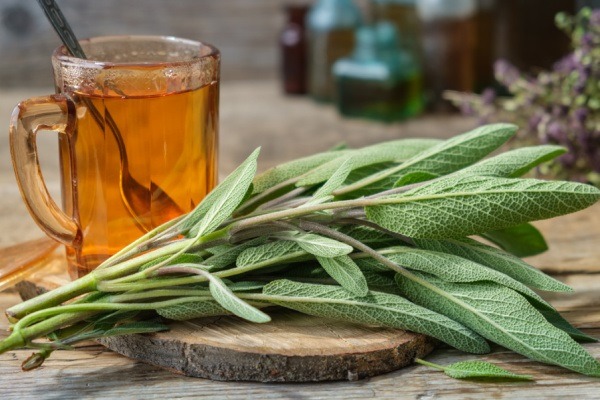
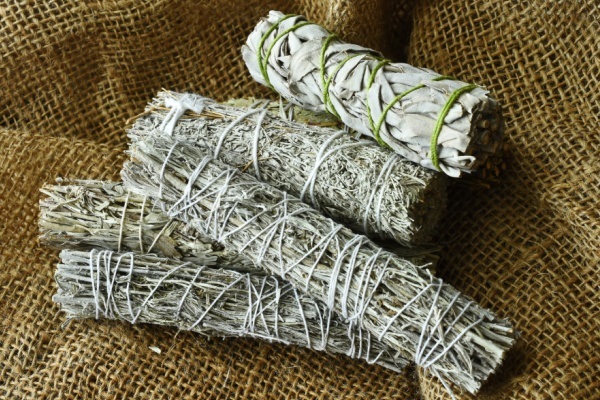
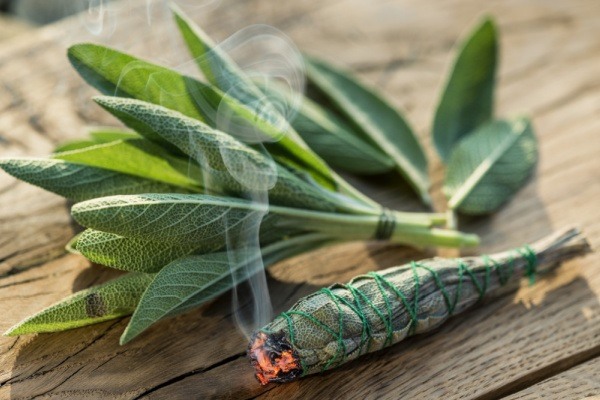
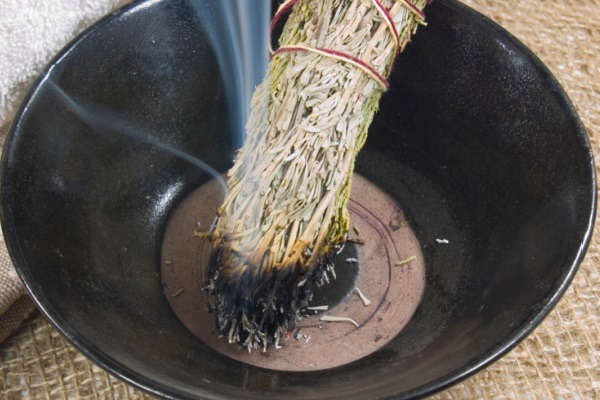
Leave a Reply